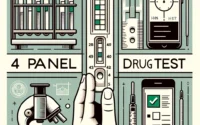Navigating Legal and Ethical Implications of Negative Dilute Drug Screens
Last Updated on November 11, 2023 by Lily
Drug testing has become a standard practice in many industries, aiming to ensure workplace safety and productivity. However, interpreting the results, particularly in cases of negative dilute drug screens, raises legal and ethical considerations that both employers and employees must be aware of.
I. Understanding Negative Dilute Drug Screens
A. Definition and Significance
A negative dilute drug screen refers to a test result that indicates the presence of a substance in the body, but at a concentration below the threshold set by the testing facility. This result is important in drug testing protocols as it may have implications for both employers and employees.
When a sample is labeled as “dilute,” it means that the concentration of the substance is lower than what is typically considered positive for a drug test. This can occur due to factors such as excessive hydration or medical conditions affecting urine concentration.
B. Legal Obligations for Employers
Employers have specific legal obligations when dealing with negative dilute results. They must follow established protocols and communicate the results to the employee in a timely and respectful manner. It’s crucial for employers to be aware of and comply with the legal requirements in their jurisdiction to ensure fairness and compliance with labor laws.
II. Employee Rights and Protections
A. Privacy Concerns
Privacy is a fundamental right, even in the context of workplace drug testing. Employees have a reasonable expectation of privacy when it comes to their medical information, including the results of drug tests. Employers must handle this information with the utmost confidentiality and only share it with those who have a legitimate need to know.
B. Americans with Disabilities Act (ADA)
The ADA provides protections for employees with a history of substance use disorder. This means that employers must make reasonable accommodations for individuals who are in recovery, as long as it does not pose an undue hardship on the business. It’s important for employers to be aware of and comply with the ADA to ensure they are treating all employees fairly and in accordance with the law.
III. Potential Discrimination Issues
A. Disparate Impact
Drug testing policies can sometimes have a disparate impact on certain groups, particularly those with specific medical conditions or backgrounds. It’s essential for employers to regularly review their policies to ensure they do not unintentionally discriminate against any group of employees.
B. Ensuring Fairness
To promote fairness, employers should implement drug testing policies that are unbiased and based on sound scientific principles. This may involve consulting with experts in the field to ensure that testing procedures are accurate and reliable.
IV. Handling Negative Dilute Results
A. Employee Notification
When an employee’s drug test results come back as negative dilute, it’s important for employers to communicate this information clearly and respectfully. This notification should include information on what a negative dilute result means and any next steps that may be required.
B. Re-Testing and Verification
In some cases, it may be necessary to re-test the sample to ensure accuracy. This could involve collecting another sample or using additional testing methods to verify the result. It’s crucial to follow established protocols to maintain the integrity of the testing process.
V. Balancing Safety and Fairness
Workplace safety is paramount, but it must be balanced with fairness and respect for employee rights. Achieving this equilibrium requires a nuanced approach and a deep understanding of legal and ethical considerations.
A. Occupational Safety and Health Administration (OSHA) Compliance
Employers are obligated to adhere to Occupational Safety and Health Administration (OSHA) regulations. These guidelines are in place to ensure a safe working environment for all employees. Drug testing policies must align with OSHA requirements, maintaining a delicate balance between safety and individual rights.
B. Creating a Drug-Free Workplace Policy
Developing a comprehensive drug-free workplace policy is a crucial step. Such a policy should outline the company’s stance on drug use, testing procedures, consequences for violations, and support mechanisms for employees struggling with substance abuse. This policy should be communicated clearly to all employees, emphasizing both safety and respect for their rights.
VI. Legal Recourse for Employees
Employees who receive a negative dilute result and believe it to be inaccurate or unfair have several avenues for recourse. Understanding these options empowers employees to advocate for their rights effectively.
A. Challenging Negative Dilute Results
Employees have the right to challenge negative dilute results. This process typically involves a thorough review of the testing procedures, potential sources of error, and any extenuating circumstances that may have affected the result. Employees should be aware of this option and feel encouraged to exercise it if they believe their rights have been compromised.
B. Seeking Legal Counsel
In some cases, seeking legal counsel may be necessary. Legal professionals with expertise in employment law and drug testing regulations can provide invaluable guidance and representation. Knowing when to involve legal professionals is crucial for employees facing challenges related to negative dilute drug screens.
VII. Education and Communication
Transparent communication and comprehensive education are foundational elements in addressing negative dilute drug screens.
A. Employee Training
Providing thorough training on drug testing policies, procedures, and employee rights is essential. This empowers employees with knowledge and ensures they understand their rights and responsibilities within the context of workplace drug testing.
B. Transparent Communication
Open and honest communication between employers and employees is vital. Creating an environment where questions and concerns about drug testing policies can be addressed fosters trust and ensures that all parties are on the same page.
VIII. Case Studies: Legal Precedents
Reviewing landmark cases related to drug testing can offer valuable insights and lessons for both employers and employees.
A. Landmark Cases
Studying significant legal cases provides context for current drug testing policies and procedures. These cases often set important precedents that shape the legal landscape surrounding workplace drug testing.
B. Lessons Learned
Extracting key lessons from past legal challenges allows employers and employees to make informed decisions and navigate drug testing policies with greater clarity.
FAQs
Q1: What does a negative dilute drug screen mean?
A negative dilute drug screen indicates that a substance was detected in the sample, but at a concentration below the threshold set by the testing facility for a positive result. It suggests possible dilution of the urine, which can occur due to factors like excessive hydration.
Q2: Are there legal implications for employers when dealing with negative dilute results?
Yes, employers have legal obligations when handling negative dilute results. They must follow established protocols, communicate results to the employee in a timely and respectful manner, and comply with relevant labor laws in their jurisdiction.
Q3: How does the Americans with Disabilities Act (ADA) protect employees with a history of substance use disorder?
The ADA prohibits discrimination against individuals with disabilities, which includes those with a history of substance use disorder. Employers must make reasonable accommodations for employees in recovery, as long as it doesn’t pose an undue hardship on the business.
Q4: Can drug testing policies have a disparate impact on certain groups of employees?
Yes, drug testing policies can potentially have a disparate impact on specific groups, particularly those with certain medical conditions or backgrounds. Employers should regularly review policies to ensure they do not unintentionally discriminate against any group.
Q5: What should employers do if an employee receives a negative dilute result?
Employers should communicate the result clearly and respectfully, providing information on what a negative dilute result means. Depending on company policy, they may consider re-testing the sample to ensure accuracy.
Q6: How can employers ensure fairness in drug testing policies?
Employers can ensure fairness by implementing drug testing policies that are unbiased, based on sound scientific principles, and comply with legal requirements. Consulting with experts in the field may be beneficial.
Q7: Is employee privacy protected in the context of drug testing?
Yes, employees have a reasonable expectation of privacy regarding their medical information, including drug test results. Employers must handle this information confidentially and only share it with those who have a legitimate need to know.
Q8: Can employees challenge a negative dilute result?
Yes, employees have the right to challenge negative dilute results. This process typically involves a thorough review of testing procedures and any potential sources of error.
Q9: When should legal counsel be involved in cases related to negative dilute drug screens?
Legal counsel should be involved when an employee believes their rights may have been compromised or if there are significant legal implications associated with the negative dilute result.
Q10: What are some best practices for employers in drug testing procedures?
Best practices include following established protocols, ensuring testing accuracy, providing clear communication to employees, and staying informed about legal requirements and industry standards.
Conclusion
In conclusion, navigating the legal and ethical implications of negative dilute drug screens requires a comprehensive understanding of both workplace safety regulations and individual rights. Employers and employees alike must be well-informed about their responsibilities and rights in this context. By prioritizing transparent communication, education, and fair policies, organizations can maintain a drug-free workplace that upholds legal and ethical standards.



